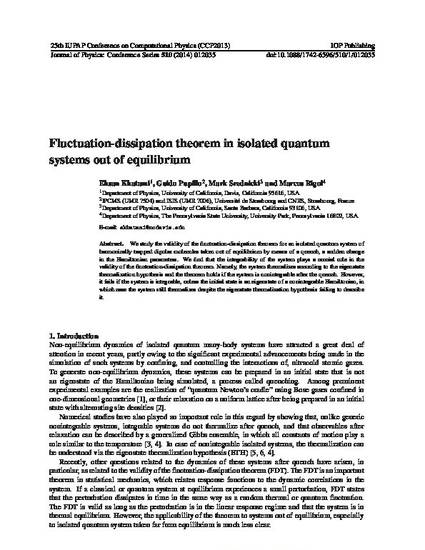
Article
Fluctuation-dissipation theorem in isolated quantum systems out of equilibrium
Journal of Physics: Conference Series
(2014)
Abstract
We study the validity of the fluctuation-dissipation theorem for an isolated quantum system of harmonically trapped dipolar molecules taken out of equilibrium by means of a quench, a sudden change in the Hamiltonian parameters. We find that the integrability of the system plays a crucial role in the validity of the fluctuation-dissipation theorem. Namely, the system thermalizes according to the eigenstate thermalization hypothesis and the theorem holds if the system is nonintegrable after the quench. However, it fails if the system is integrable, unless the initial state is an eigenstate of a nonintegrable Hamiltonian, in which case the system still thermalizes despite the eigenstate thermalization hypothesis failing to describe it.
Disciplines
Publication Date
2014
DOI
10.1088/1742-6596/510/1/012035
Publisher Statement
This paper was first published in the Journal of Physics: Conference Series, volume 510 (2014), published by published by IOP Publishing Ltd. It can also be found online at this link.
This paper was originally presented at the 25th IUPAP Conference on Computational Physics (CCP2013), held 20–
24 August 2013, Moscow, Russia.
Citation Information
Ehsan Khatami, Guido Pupillo, Mark Srednicki and Marcos Rigol. "Fluctuation-dissipation theorem in isolated quantum systems out of equilibrium" Journal of Physics: Conference Series Vol. 510 (2014) ISSN: 1742-6596 Available at: http://works.bepress.com/ehsan_khatami/30/
Creative Commons license

This work is licensed under a Creative Commons CC_BY International License.
